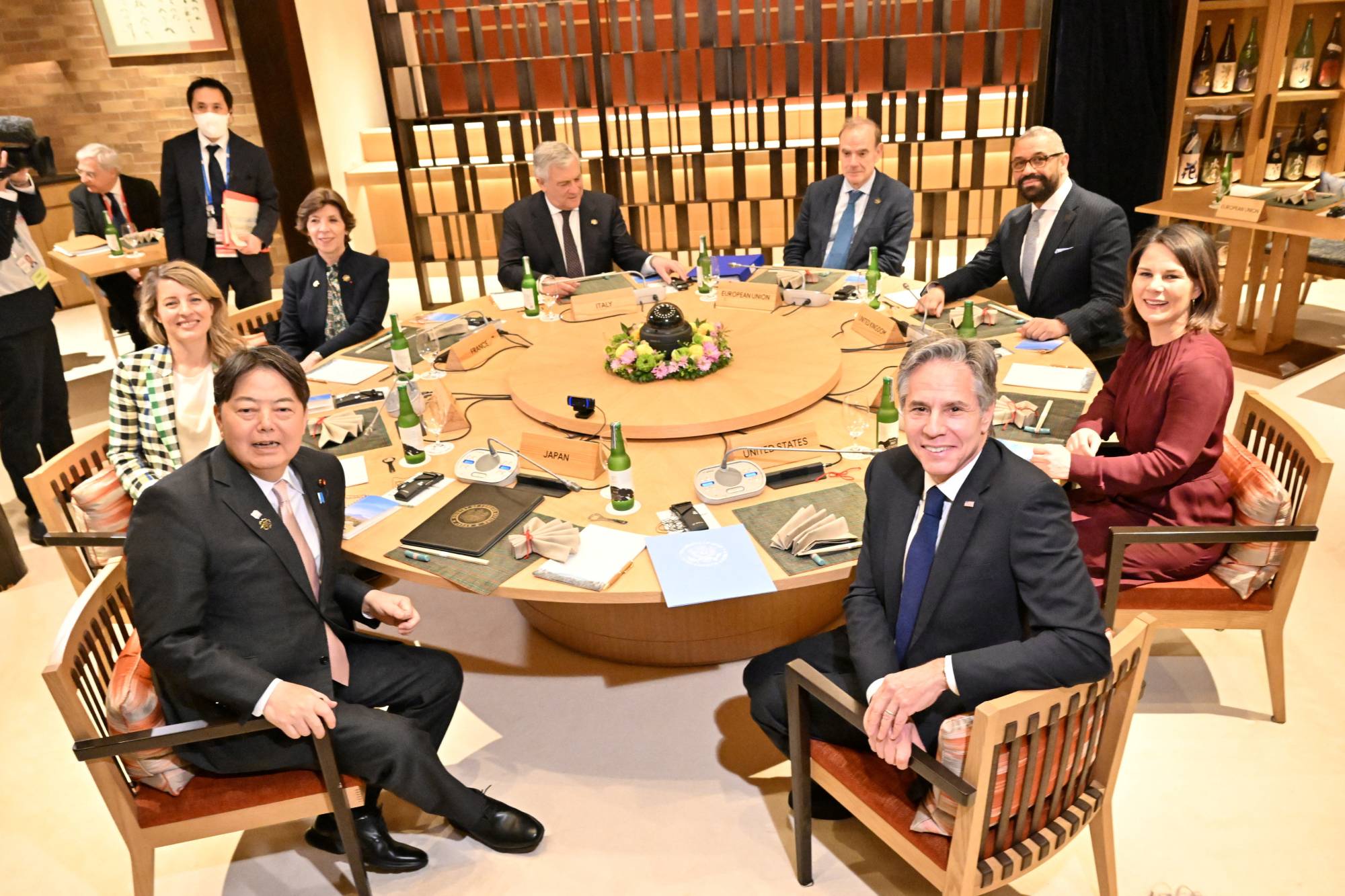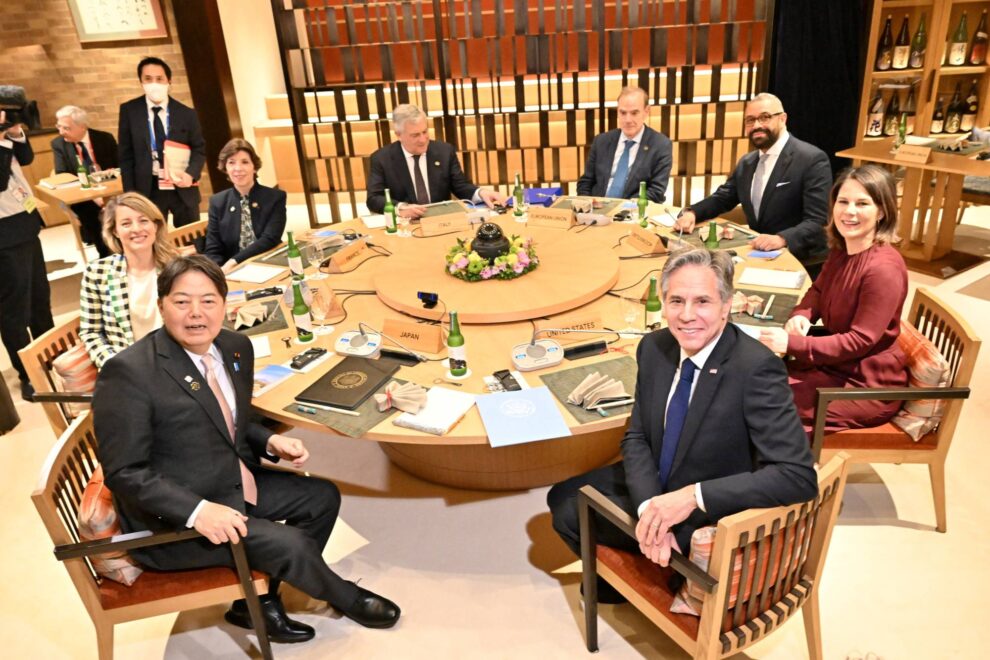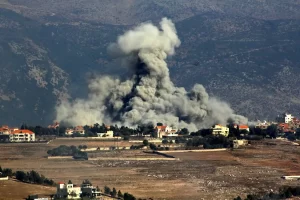The G7 ministers gathered for a second day of meetings in the mountain resort of Karuizawa, Nagano Prefecture, on Monday after earlier highlighting the need for a united front in the Indo-Pacific region and in intensifying and fully enforcing sanctions on Russia as its bloody invasion of Ukraine continues.
The calls for unity came in the wake of stunning comments earlier this month by French President Emmanuel Macron, who said there was a need for European “strategic autonomy” on the issue of Taiwan amid fears some could be dragged into a conflict between the U.S. and China over the fate of the self-ruled island.
Last week, China’s military wrapped up three days of large-scale military drills around Taiwan that included air and sea blockade training and simulated strikes by warplanes on the island. Those drills came just days after Taiwanese President Tsai Ing-wen’s landmark meeting earlier this month with U.S. House Speaker Kevin McCarthy in California.
On Monday, the U.S. Navy sent a warship through the Taiwan Strait on a “routine” transit, a move China’s military said it had “closely monitored.”
Beijing views Taiwan as a “core issue” and calls the democratic island a renegade province that must be unified with the mainland — by force, if necessary. It has repeatedly criticized outside forces of meddling in what it says are its “internal affairs.”
This criticism, however, was highly unlikely to prevent concerns over its moves near Taiwan from being included in the ministers’ final joint declaration.

Underscoring this stance, the top diplomats agreed late Sunday to oppose unilateral attempts to change the status quo by force, while also reaffirming the importance of “peace and stability” across the Taiwan Strait “as an indispensable element” of the security and prosperity of the international community, the Japanese Foreign Ministry said in a statement.
Macron’s remarks, which came during a visit to Beijing, stoked criticism from some in the United States and Europe and threatened attempts by Japan — this year’s G7 chair — to promote a united bloc in urging China to adhere to the global rules-based order.
While the ministers agreed to call on China “to act as a responsible member of the international community,” Foreign Minister Yoshimasa Hayashi, host of the summit, also sought to balance this call with a more diplomatic approach, emphasizing the importance of “working together with Beijing” on global challenges and areas of common interest in an attempt to build “a constructive and stable relationship.”
During talks Monday, the second day of the three-day meeting, the ministers reiterated G7 nations’ strong commitment to continuing to support Ukraine in its war against Russia and demanded that Moscow withdraw all forces “immediately and unconditionally.”
They also slammed Russian leader Vladimir Putin’s “irresponsible nuclear rhetoric” and condemned his recent announcement that Moscow will deploy tactical nuclear weapons in Belarus.
In a bid to tighten the noose around Russia over the invasion of its neighbor, the ministers pledged to reinforce coordination in preventing and responding to sanctions evasion, as well as attempts by third parties to supply weapons to Moscow.
“As the international community faces a turning point in its history, we will not tolerate unilateral changes in the status quo by force, including Russia’s aggression against Ukraine and its nuclear threats,” Hayashi said at the opening of Monday’s talks. “We want to demonstrate to the world the strong determination of the G7 to defend the international order based on the rule of law.”
Energy and food security, as well as strengthened engagement with countries known as the Global South — a loose grouping of some 100 nations, many developing and nonaligned with any major power, that includes India, Indonesia, Brazil and South Africa — was also discussed.

On Sunday, the first day of the three-day meeting, the ministers also delivered a strong condemnation of nuclear-armed North Korea’s spate of recent ballistic missile launches, saying they had been conducted at “an unprecedented frequency and in unprecedented manners.”
Last week, North Korea tested what it said was a new solid-fueled intercontinental ballistic missile believed capable of delivering a nuclear bomb to most if not all of the continental United States. The launch stoked concern in Japan on Thursday, prompting the government to briefly issue a rare J-Alert warning for Hokkaido residents to seek immediate shelter.
But, in a sign that missile tests are likely to continue, North Korean leader Kim Jong Un has called for “more practical and offensive” capabilities and an expanded and strengthened “war deterrent” — a euphemism for his nuclear arsenal.
In response, Japan, South Korea and the U.S. have bolstered bilateral and trilateral security cooperation, including rare missile defense exercises involving all three countries in the Sea of Japan on Monday. Those exercises came as the U.S. and South Korea kicked off large-scale combined air drills the same day involving about 110 aircraft.
The G7 groups Japan, Britain, Canada, France, Germany, Italy, the United States and the European Union.
Japan, the sole member from Asia, is hoping to use the foreign ministers’ summit — which was set to conclude Tuesday with the joint statement — to lay the foundation for the G7 leaders’ agenda at their summit next month in the city of Hiroshima.
Source: Japan Times










